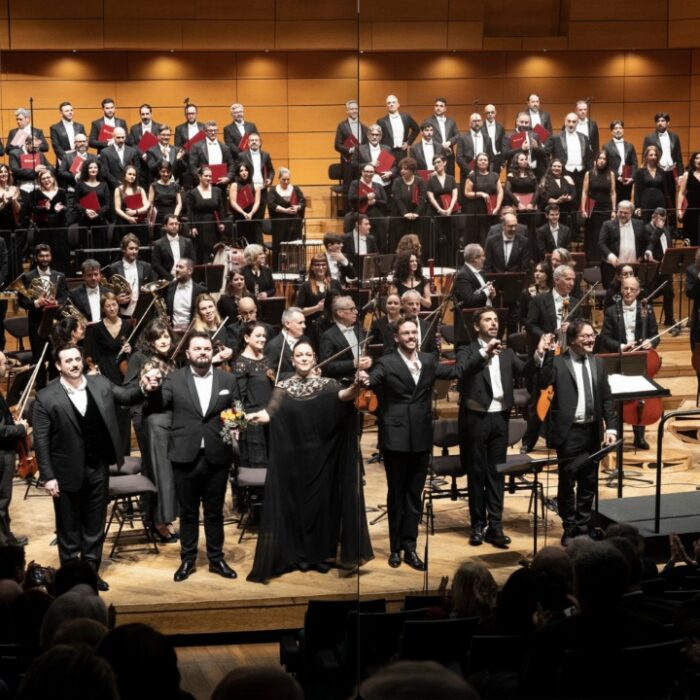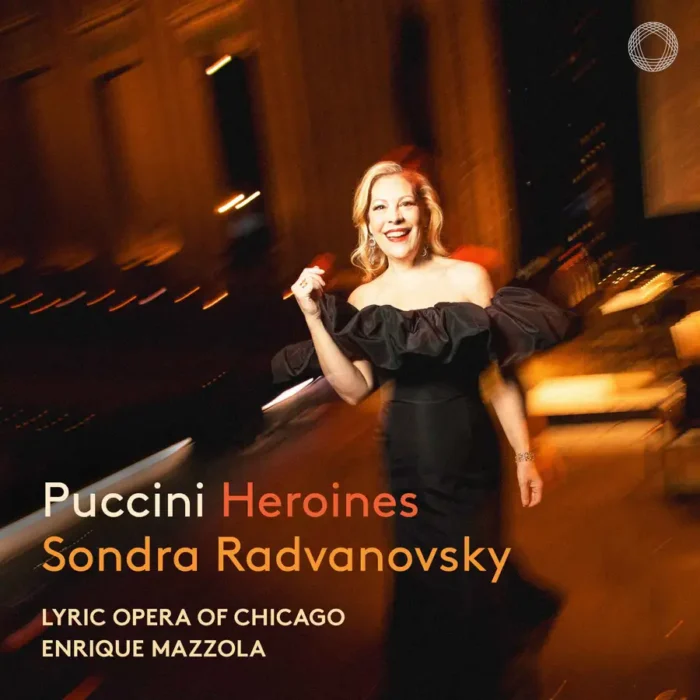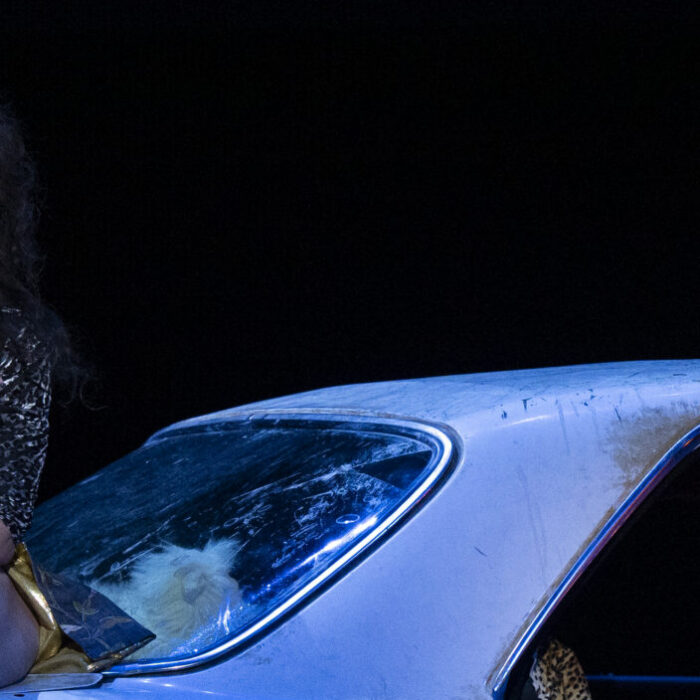
Royal Ballet and Opera 2024-25 Review: Eugene Onegin
Less is more in Huffman’s main stage debut at Covent Garden
By Benjamin Poore(Photo: Tristram Kenton)
“Eugene Onegin,” Tchaikovsky’s reworking of Pushkin’s verse novel into seven ‘lyric scenes,’ has not been seen on the Covent Garden stage for nearly a decade. Ted Huffman’s new staging would have been an event for that reason alone, but its significance was underlined by the fact that it sees one of the most striking young directors making his main stage debut at the Royal Opera.
His work is celebrated for its meticulous psychological detailing and rich characterization, amplified by bold, graphic design and relative simplicity in his stagings. Expectations were high following his debut with the company in 2016, at the Lyric Hammersmith a few miles away, in his bracing production of Philip Venables’ “4.48 Psychosis,” adapted from the savage play by Sarah Kane. As librettist himself – he collaborated with Venables again for the chilling, televisually-styled “Denis & Katya” in 2019, and “The Faggots & Their Friends Between Revolutions” for Aix and the Manchester International Festival in 2023 – he has demonstrated a strong commitment to opera as a living, breathing art form, held together by tough emotional sinews and theatrical intensity.
Haunting & Compelling
How would this pay off? Huffman’s production, designed by Hyemi Shin – responsible for similarly spare versions of “Wozzeck” and “Samson et Dalila” in the last couple of years – is stripped-back and, for the most part, riveting, bringing his detailed personregie to the fore. The flat stage is empty, with some fog swirling upstage; the main playing area is downstage, with a couple of chairs and not much else, with scant props – the letter scene features a single table illuminated by candlesticks. Passing time is marked by messages projected on the backcloth, with a flurry of snowfall for the winter duel, then swept up in front of us by a troupe of dancers – only seven or so in number – before a not-so-lavish and rather ghostly ball begins.
Costumes – by Astrid Klein – are placelessly modern, with Onegin dressed with severe simplicity. There are no bucolic peasant dances or glittering depictions of Muscovite society. There is artful expressive simplicity done with minimal means, in this regard: Tatyana, when meeting him after sending the ill-advised letter, is still wearing her silken pajamas underneath her coat, and borrows a pair of skimpy kitten heels from Olga; she isn’t dressed for the emotional climate out there, and her playing at womanhood heightens her vulnerability. All the while, Origin barely looks at her as she is stonily mortified, in a truly painful scene.
Huffman’s eschewal of the spectacles often associated with the piece is faithful to Tchaikovsky’s own wishes for the piece, which he wanted to be staged with relative simplicity at the Conservatory by young singers rather than the more lavish homes for his scenic works like the Bolshoi and Mariinsky theaters, craving emotional immediacy and authenticity above all. The effect in this production is dreamlike, as if we are in a space of fantasy and recollection framed by the illuminated proscenium, with the literal foregrounding of the characters at the expense of fussy background detailing creating the impression of memories which the characters hauntedly turn over.
Onegin arrives at the top of the show and makes a curt bow to the audience and retreats to watch the action until he enters later – we are keenly aware that the bookish imagination of Tatyana really has dreamt up this erotic wraith before she ever met him. As he remains onstage almost entirely throughout, he is joined by Monsieur Triquet, an eerie clown who feels like a hallucinatory fragment of the past that guides him through what seems like an increasingly anguished journey into his past, filled with regret and error. The ghost of Lensky, who takes a bow himself after his suicide, watches the rest of the action unfold from the back – perhaps we are meant to infer Onegin, too, will – or has? – killed himself after Tatyana’s final rejection too. The vast empty stage gives the whole thing a purgatorial quality, and underlines the existential character of the story; characters and their decisions are rendered tiny and isolated. “To suffer and to think,” Pushkin once wrote of life, and Huffman captures its terrors perfectly; understated lighting – mostly simple, steady states from DM Wood – was an apt complement.
Above all, there is space for fastidious direction – the final scene is gripping, with Tatyana’s family life – six years, we are told, have elapsed since the duel – pulling her away from Onegin. She is wonderfully playful – and woundingly naive – in her letter scene, which she pens with the help of Olga, who surely should’ve known better – though she herself has an ill-advised affair with Onegin, as they have sex before the party. Lensky is a dangerous, self-destructive character, who shoots himself in the duel after Onegin lays down his weapon, clearly having lost both wife, friend, and reputation. If you don’t like an interventionist approach to plot and story, then you will hate this, but Tchaikovsky’s own rather extravagant adaptation of Pushkin surely offers Huffman a similar license.
There are some untidy aspects to these machinations. Following Olga and Onegin’s passionate tryst before the party – one of the few moments where he seems truly alive – why does their encounter in the Gremin household so many years later see her express so little? Their journey felt unfinished. And such an anonymously modern staging means that some of the work’s key ideas disappear into the upstage fog – it is a work about class and snobbery, and the country and the city, which hardly register. The ball scene, too, felt clumsy and under-developed – one or two dancers on a large, empty stage has a tremendous impact on its own, but six or seven carrying on tables and tablecloths hardly matched the excitement generated from the pit, whilst Onegin rather banally put on a jacket and tie, with the whole scene sitting in an odd visual middle ground. Apart from this, Huffman’s vision is exacting and compelling, forcing singers to act well and command the stage without recourse to silly props or diversionary business. Best to get a seat as close as possible to the stage though, with such detailed direction.
Youth & Freshness
It is a younger cast – perhaps another nod to Tchaikovsky’s wishes – who bring a great deal of freshness to the score – despite the challenges of the completely uncovered set, and a few balance issues that occasionally saw voices overwhelmed. Among the highlights was Liparit Avetisyan’s Lensky, who made an excellent impression in last season’s revival of “L’elisir d’amore.” Avetisyan, whose core repertoire is mostly Italianate, brings an intense lyricism to the role as well as fabulous technical security. Top notes were bronzed, strong, and ardent, with an intensity that is both passionate and impetuous, and keys in well to the character’s reckless wildness in this production – someone already on the precipice of self-destruction. His pre-duel aria had a restless, compelling urgency, and nearly stole the show.
Gordon Bintner’s Onegin was also accomplished, if somewhat less secure. His baritone is rounded and easygoing, with an oily richness that was especially effective in his scene three aria with Tatytana, as he destroys her with careless, condescending ease; the brisk tempo and limpid phrasing only heightening his blitheness. Tall and shaggy-haired, he looked perfect for the show too – commanding and charismatic, as well as being enigmatically removed. Later, though, he struggled with the high notes Tchaikovsky calls for, which lost definition in his final scene with Tatyana, and the top conclusive top G proving rather reedy and anticlimactic. Still, his acting was hugely engaging throughout.
Kristina Mkhitaryan made a strong impression as Tatyana, a role she will surely come to make her own in the future. The letter scene impressed, with crystalline top notes of translucent beauty and tenderly-judged moments of softness and yearning messa di voce swells, in keeping with the teenage hi-jinks implied in Olga’s conspiratorial involvement as co-author. There was an early intimation of her voice’s power with the offstage singing that opens the show, ringing in beautifully from the wings. It came to the fore in the thrilling finale, where she took on a steely, defiant quality, with a tightly-wound vibrato, to read Onegin the riot act, almost snarling at points in anguish and frustration. Her final farewell blazed with both.
Supporting roles were engagingly directed; Avery Amereau’s Olga especially so, with a contralto that makes for a more sensuous and worldly counterweight to Tatyana. Christophe Mortagne’s Triquet was an unearthly presence as a creepy magician, though phrasing was a little ragged and his breathing inconsistent when subjected to the rather slow tempo imposed from the pit for his party-scene serenade. Dmitry Belosselskiy missed the opening night due to illness, replaced by Brindley Sherratt at short notice. On his return, the middle and lower registers had an oaky richness and quiet intensity, revealing the joy he finds in Tatyana, though perhaps some frayed high notes and moments of strain indicated that his recovery wasn’t quite complete.
Henrik Nánási conducted the Orchestra of the Royal Opera House, shaping the score with lyrical insight from the outset. The sighing string figures of the opening had varied patterns of emotional light and shade, one sequence yearning, another resigned. That responsiveness was on display throughout in the arias, especially those of Gremin and Onegin in Act one. The dances and climactic orchestral eruptions were governed by rhythmic vitality and impetuous articulation, and made for thrilling interludes and commentary by turns; the Royal Opera Chorus was in equally snappy form too. Despite a few vocal wrinkles, Huffman has made a striking main house debut supported by fabulous work in the pit.


